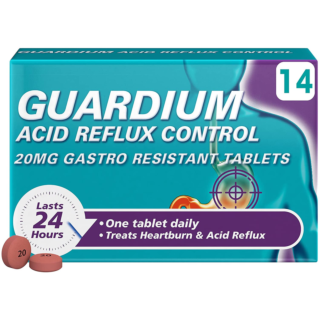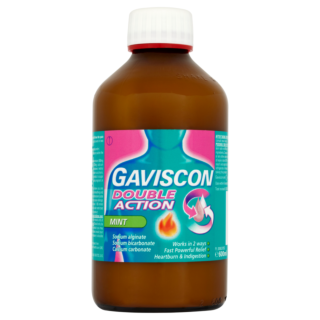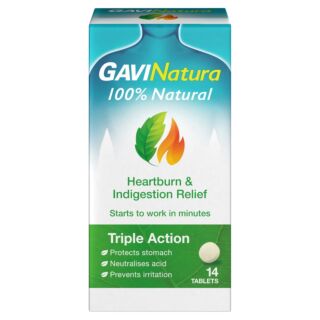Dealing with indigestion & heartburn this Easter

Easter can be an indulgent time of year for many people, and whilst we drool at the idea of endless amounts of chocolate and roast dinners, we know it can wreak havoc for those who suffer from indigestion and heartburn.
Before you cancel your Easter plans, let us guide you through ways to enjoy the festivities without suffering indigestion symptoms.
What is indigestion and heartburn, and are they the same thing?
Indigestion and heartburn are often referred to as the same condition. The symptoms, causes and treatments are similar, but they are different gastrointestinal conditions because of the areas of the body they affect.
Indigestion affects the abdominal area, whereas heartburn symptoms can be felt in the chest and oesophagus. Indigestion causes symptoms of bloating, nausea, belching and regurgitation. Symptoms often occur after eating and are triggered by certain foods, including chocolate (sigh!).
It’s thought that stomach acid irritating the stomach lining or oesophagus brings on indigestion symptoms. Heartburn can occur when stomach acid irritates the oesophagus specifically, as the typical burning feeling can be felt in the chest behind the breast bone.
Both heartburn and indigestion can be made worse by certain foods, the time of day you eat, certain medications, smoking, pregnancy, stress and being overweight. Avoid or limit foods that trigger your indigestion. The main culprits are spicy or fatty foods, coffee, alcohol, tomatoes, and unfortunately, chocolate.
How does chocolate cause indigestion and heartburn?
The ingredients in chocolate such as cocoa, caffeine and theobromine, can worsen indigestion and heartburn in some people. These ingredients can relax the lower oesophageal sphincter (LOS) due to a surge in serotonin.
The LOS is a muscle that connects the oesophagus to the stomach, and its purpose is to stop the contents of your stomach from regurgitating back up the oesophagus. If the LOS is weak or relaxed, stomach acid may leak causing symptoms of indigestion or heartburn.
Chocolate is also high in fat, and fatty foods can increase stomach acid production. Whilst we do need stomach acid for normal digestion, too much can be a risk factor for developing heartburn and indigestion.
If you’re unsure if chocolate is your trigger, try slowly eliminating it from your diet and keeping a food diary that documents what you have eaten and when and how you feel. Whilst chocolate can cause indigestion and heartburn, this isn’t the case for everyone. You may find that chocolate isn’t a problem for you and it is still possible to enjoy it in moderation.
Is it all types of chocolate?
Dark and milk chocolate contains cocoa, caffeine and theobromine, which can trigger indigestion and heartburn in some people. White chocolate does not contain cocoa solids and therefore has almost no theobromine or caffeine present.
However, milk and white chocolate have a higher fat content and lack some of the nutritional benefits of dark chocolate. Dark chocolate containing 70% or more cocoa is an antioxidant, it is high in fibre and contains important minerals such as iron. It may also contribute to heart health if consumed in moderation.[1]
There is no harm in experimenting with different types of chocolate to see if one affects you more than another.
What to eat at Easter instead of chocolate
There are plenty of other sweet treats available other than chocolate. A top tip is to make your treats yourself so you know what your ingredients are and can cut back on those ingredients that can trigger indigestion or heartburn.
Honey is a great alternative to chocolate or other sugars to sweeten food. It also has lots of nutritional benefits and can even help heartburn and indigestion by reducing inflammation in the oesophagus and eliminating free radicals that can damage cells in the digestive tract, [2].
Add whole nuts for texture and crunch or nut butter for a similar creaminess as chocolate. As an alternative to white chocolate, try freezing fat-free yoghurt with fruit, nuts, honey and any other topping you like and cutting them into bars. Yoghurt is a probiotic[3] that can help improve the function of the digestive system.

Preventing indigestion and heartburn this Easter
Preventing the onset of indigestion and heartburn will ensure a joyous Easter. Here’s how to avoid it:
Don’t eat too close to bedtime
Easter is one of the only times of the year when it is acceptable to eat chocolate for breakfast! Whatever you’re eating this Easter, try to avoid food 3 to 4 hours before going to bed.
Lying down makes it harder to digest food and easier for the contents of your stomach to regurgitate back up the oesophagus causing those nightmare indigestion symptoms.
Make sure to eat other foods, not just chocolate!
A day full of eating chocolate is bound to bring on a bout of indigestion, so ensure the day’s menu is full of variety. If your stomach is full of other foods, you’re less likely to crave chocolate. A healthy, balanced diet should be maintained throughout the year including during festivities.
Don’t overindulge
The key to an enjoyable Easter is not to overindulge. Rather than eating all of your chocolate eggs in one day, you can savour the delight over a few days or even weeks. Moderation is important to avoid aggravating your digestive system. Stick to 3 meals a day with a small treat in between and finish up eating 3 to 4 hours before bed.
Go dark
If you must eat chocolate, choose dark over milk or white chocolate as this is less likely to cause indigestion or heartburn.
Whilst dark chocolate contains caffeine and theobromine, the darker it is, the less fat content it will have. If you’re eating chocolate, avoid other indigestion-triggering foods. The more foods like this you eat, the more likely you will experience symptoms.
How to treat heartburn and indigestion this Easter
If you’ve not managed to keep heartburn and indigestion at bay this Easter, do not worry, there are ways to relieve symptoms.
Over-the-counter medications
Gaviscon
Gaviscon is a brand known for its fast-acting and long-lasting relief of heartburn and indigestion. Gaviscon is an antacid[4] which is a type of medicine that neutralises acid in the stomach. Gaviscon works in two ways:
- 1. It creates a protective barrier over stomach acid to stop it rising through the oesophagus
- 2. It neutralises acidity
The Guardium range belongs to a group of medicines called proton pump inhibitors (PPIs)[5] which reduce the amount of acid in your stomach.
There are many different types of antacids and PPIs to choose from and in many forms such as liquid, tablets and capsules.
Natural indigestion remedies
If you want to try the natural remedy route, there are plenty of options that you may already have in your cupboard at home.
Here are some things to try to calm your indigestion symptoms:
- Peppermint
- Chamomile tea
- Ginger
- Apple Cider Vinegar
- Lemon water/juice
- Baking soda
All of the above should be taken in moderation and diluted in water. All have been known to reduce digestive discomfort when consumed correctly.
GaviNatura
GaviNatura belongs to the Gaviscon range but it contains 100% natural origin ingredients and is a great alternative to other indigestion medicines. Its natural ingredients make it suitable for children over the age of 6 and pregnant and breastfeeding women.
It works by strengthening the body’s natural defence systems by creating a protective film that lines the mucosa of the gastro-oesophageal tract to reduce its contact with stomach acid and other irritants, thus relieving symptoms of heartburn and indigestion.

If you don’t want to miss out on the traditions of Easter, keep your chocolate intake to a minimum and have your medicine cupboard stocked in case indigestion strikes. Although you can get indigestion and heartburn from chocolate, you can avoid symptoms by not overindulging, opting for dark chocolate over milk, and trying alternative sweet treats that may even be more delicious than chocolate!
Sources
- [1] https://www.heartuk.org.uk/low-cholesterol-foods/dark-chocolate
- [2] https://www.ncbi.nlm.nih.gov/pmc/articles/PMC3978955/
- [3] https://www.nhs.uk/conditions/probiotics/
- [4] https://www.nhs.uk/conditions/antacids/#:~:text=Antacids%20are%20medicines%20that%20counteract,and%20shops%20without%20a%20prescription.
- [5] https://patient.info/digestive-health/indigestion-medication/proton-pump-inhibitors#nav-0








